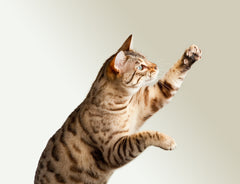
Your cat's claws are an important part of their daily lives. Cats scratch to express excitement, to mark territory, to exercise and to groom themselves. Their claws serve to stretch their muscles, as traction for walking, climbing, and balance, as well as for self-defense and hunting. So why declaw cats?
One main reason some cat owners declaw their cats is to prevent them from scratching furniture or people. But while the payoff sounds good for the owner, the results for the cat are not. If you have a cat scratching problem and are looking for alternatives, read on.
Some side effects of declawing a cat include: urinating and defecating outside the litter box, personality changes showing an increase in stress, aggression and fearfulness, less physical activity, and other behavioral problems. These changes may be gradual and appear to be common symptoms of an aging cat, but they're really a result of being declawed.
The surgery is expensive: An average of $100 to $500 per cat. It promises a worthy investment: A one-time high cost for the peace of mind that comes from knowing the cat will no longer be able to scratch. However, the cat will still flex their paws or make scratching motions, indicating the continued instinct to scratch.
Declawing is traumatic for the cat: It is a painful surgery that is similar to amputating a human's finger at the first joint. It is more than just the equivalent of a human fingernail; it's part of the last bone in their toes. So "declawing" is a misnomer which leads people to believe only the claw is being removed. And cats might have phantom pain that lingers well after surgery. It's even possible for claws to invisibly grow back inside the paw, causing deformity and chronic pain.
Declawed cats tend to "do their business" outside the litter box more often in order to mark their territory. They can get more aggressive, and may resort to biting. It is a myth that they can instead use the claws of their back feet (assuming they were left intact) since they would have to be on their backs, leaving them vulnerable to attack and abuse. This puts them at a disadvantage if they live with other cats or go outside. Finally, cats have to relearn how to walk after declawing surgery. This is because they are forced to stand at an unnatural angle, causing back pain.
It is for these reasons that several countries have banned the procedure and many veterinarians refuse to perform it. However, there are many other ways of dealing with a cat's scratching problem. Anxiety in cats can result in scratching, and using hemp oil is helpful. This all-natural supplement enables the cat's body to calm down and may reduce scratching in anxious, stressed or territorial cats.
Some other alternatives, which can be used in conjunction with hemp oil, are:
- using tall scratching posts sprinkled with catnip;
- using vinyl nail caps;
- applying double-sided tape on furniture where the cat scratches;
- using pheromone products to reassure territorial cats;
- regularly clipping the cat's claws; and
- alternating between indoors and outdoors, which is ideal for cats and allows them to scratch outside
For more details on Hemp oil for cats and providing for your cat's needs, contact us.
















